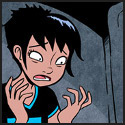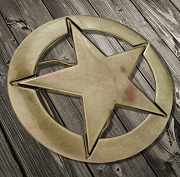|
Mearls has something of a point in that if you want a game that's all about cleaving to archetypes then you don't want/need a huge list of all sorts of jargon-y options all over the place because you're trying to stick to those archetypes. Fine, okay, except this sort of overlooks that A). a bunch of people play D&D to mash together a half dozen classes and prestige classes and templates into some horrible transporter accident of a character and B). that a lot of things that have gone on to "resonate" with players are things that weren't "traditional D&D archetypal" from the get-go. Yes, like Warlords. Or 3E Sorcerers for that matter, that's a thing that wasn't "archetypal" by D&D standards and now it's so drat popular that it's been in two successive editions of D&D and Pathfinder has all sorts of crazy-rear end options for Sorcerers. Also it sort of ignores that there's another, perfectly valid approach to creating characters and that's to go mechanics first and then think about what sort of character that collection of pieces brings to mind. Maybe he has a point in that the people who very first started playing D&D back in 197X weren't doing it "because they wanted to take Rapid Shot" but these days, y'know, that's not exactly some weird foreign way people like to approach making the greatest archer ever. And as long as D&D has been a game that ostensibly claims to emulate all these amazing fantasy stories and archetypes while mechanically doing a pretty uneven job of doing so at best, fiddling around with the game mechanics like a bucket of Lego bricks has been a time-honored way for players to actually make the character they want rather than the character they thought they wanted but turned out in practice to be something else. Selling people a smaller bucket of Legos and hand-waving it away with "we really want to stop adding so much stuff to the mechanics of the game and shift our emphasis to story"...wait, does this mean Next is a storygame now? I'm confused. edit: There are some good points people made on the page prior to this one before I accidentally got the top of the next page, go and read them. Part of what drives me nuts about these L&L columns is I never really know what point Mearls is driving at, which I'm fully willing to cop to being my fault since it's not like he's the Timecube guy or anything, but still. Kai Tave fucked around with this message at 01:49 on Mar 2, 2013 |
|
|
|

|
| # ? May 7, 2024 13:30 |
|
Yeah, from what I read it's more a matter of organization than anything. Rather than selecting Point Blank Shot, Precise Shot, Rapid Shot, Eight Other Feats To Be 1/10 As Effective As Your Buddy Gandalf, the options you need are presented in the Archer package. I have some issues with a few things in there but the part about presentation is a good one. (I also don't think the 5e team is gonna pull this off, since there have been other top-level stuff like this they either abandoned or didn't quite fulfill)Old Kentucky Shark posted:Hamburgers are more of a condiment delivery system anyway. Yes. I'm pretty sure I eat hamburgers mostly as an excuse to eat lots of onions and garlic pickles.
|
|
|
|
Majuju posted:Gau: there was a Danger Patrol game but it only ran for like two pages before it was abandoned Actually, give it to me in the chat thread to keep the hamburger and bourbon thread from getting too derailed. VVV Splatbooks for next? What? VVV
|
|
|
|
My wife was just bored. chronic fatigue/disgust. Like you know those people who have all kinds of things wrong with them but doctors just cant help them? She was wasting away and could not enjoy anything. We have always played an 'enjoyable' game. Our sessions before going Next were usually a random encounter or sometimes a boss fight, with a whole bunch of local flavour. Even though we were doing all kinds of 'fun' things, my wifes interest was still declining to where we both knew she was going to quit the campaign and we just didnt know what else we could do! I think i was browsing around on the net and came across the 4e (mmo-type) style. I thought the theory was interesting but it sounded like a pretty good way to mess your game up. D&D Next and expertise dice were soon discovered and i brought home a slew of splatbooks and dice. She was not amused but choked it down and went 'hey, that felt like it actually worked' 'my elfgame isnt all hosed up' After crying into her character sheet for a few months we really noticed the difference (I did it too) And all kinds of things that we used to think were 'normal' were actually NOT normal. You do not know what your PC is supposed to feel like until you have faced rust monsters (we did not really do 4e, we pretty much went from BESM to 3e, ditched the warlords because we knew they were bullshit) We actually live in conventions for most of the year (in fact i just put a wall scroll in my room so we're heading back out into Gencon for 4-season convention living) in a motel. So the majority of the games that we play are 'old school' since we have no showers. Its funny how your tastes change, and your idea of taste. Story-games are now bland and boring. We prefer the older editions, it just gets more flavor as the decades go on. I imagine its kind of like how people develop taste for other fermented things like cheese and wine. Something else we found was that you're told that playing BESM will pretty much kill your life. When you find out that it doesnt, in fact after playing it you sometimes feel euphoric; what other things were I afraid of that were not actually real? We dont really use backgrounds, an occasional encounter for me but my wife has no interest in anything that isnt rules-based. The theatre of the mind is the gold. Your game goes through a pretty rough adaption process learning to enjoy dice instead of roleplay. After you have done that you feel pretty awesome. We play the whole campaign, stranger-in-the-inn to random encounters. tl:dr; D&D Next is the tits.
|
|
|
|
^^^What the gently caress am I reading?Mikan posted:Yeah, from what I read it's more a matter of organization than anything. Rather than selecting Point Blank Shot, Precise Shot, Rapid Shot, Eight Other Feats To Be 1/10 As Effective As Your Buddy Gandalf, the options you need are presented in the Archer package. If this is what Mearls is getting at it's a sentiment I can get behind, but he could really save himself some wordcount by just saying "We think feat bloat sucks just as much as you do, so we're wrapping that poo poo up yo." Because feat bloat does suck. Kai Tave fucked around with this message at 01:59 on Mar 2, 2013 |
|
|
|
Barudak posted:Also have we seen anything that keeps aggro in this game? Lack of stickyness in previous DnD's meant that gentlemans agreements were the only reason the wizard survived anything. My Pathfinder DM actually said he thinks "aggro mechanics are dumb" so there's your D&D Next audience. I'd try explaining to him why he is wrong but it would probably go, "blah blah cognitive dissonance blah blah."
|
|
|
|
Kai Tave posted:Mearls has something of a point in that if you want a game that's all about cleaving to archetypes then you don't want/need a huge list of all sorts of jargon-y options all over the place because you're trying to stick to those archetypes. Fine, okay, except this sort of overlooks that A). a bunch of people play D&D to mash together a half dozen classes and prestige classes and templates into some horrible transporter accident of a character and B). that a lot of things that have gone on to "resonate" with players are things that weren't "traditional D&D archetypal" from the get-go. Yes, like Warlords. Or 3E Sorcerers for that matter, that's a thing that wasn't "archetypal" by D&D standards and now it's so drat popular that it's been in two successive editions of D&D and Pathfinder has all sorts of crazy-rear end options for Sorcerers. This is all well and good, except he's already stated that 5e is going to use the 3e style of class that aren't really classes, which makes absolutely everything he just said pointless. 3e is by far the weakest rendition of the class system, and more then anything else contributed to the view of classes being "bags of mechanics" without fluff. Having that yet still talking about wanting to maintain the "core identity" of classes is laughable at best. Going on about "nobody plays because they want to take Rapid Shot" doesn't work if your system is built for building the guy who takes Rapid Shot.
|
|
|
|
Kai Tave posted:^^^What the gently caress am I reading? The only way I can comment on D&D Next with a meat reference.
|
|
|
|
Alright, let's break this down point by point from the perspective of an (amateur) game designer.Kai Tave posted:Mearls has something of a point in that if you want a game that's all about cleaving to archetypes then you don't want/need a huge list of all sorts of jargon-y options all over the place because you're trying to stick to those archetypes. Fine, okay, except this sort of overlooks that A). a bunch of people play D&D to mash together a half dozen classes and prestige classes and templates into some horrible transporter accident of a character and B). that a lot of things that have gone on to "resonate" with players are things that weren't "traditional D&D archetypal" from the get-go. Yes, like Warlords. Or 3E Sorcerers for that matter, that's a thing that wasn't "archetypal" by D&D standards and now it's so drat popular that it's been in two successive editions of D&D and Pathfinder has all sorts of crazy-rear end options for Sorcerers. Even as someone who got into playing D&D from 3.X, this really isn't the case. People like customization, yeah, but mashing together eleventy billion classes and PrCs and poo poo got you the stink-eye from DMs, either made you suck or stupid good as a player, and was a goddamned headache all around. The defenders of, say, 3.X fighter-types multiclassing all the live long day were the CharOp boards and guys like Frank Trollman; people hate those fuckers. From a player and a designer standpoint, discrete and modular ability chunks are good enough. Class, race, theme, background, maybe a subclass, and some feat-type things; that offers a large potential amount of creatable characters without creating something impossible to properly playtest. I don't know how popular Sorcerers actually are (Skip Williams had a hate boner for them, they didn't get introduced in 4E until the PHB2, and never really got the options Wizards did), but the innately magical magic guy is archetypical beyond D&D. Using the Warlock might've been a better example, or the Monk. quote:Also it sort of ignores that there's another, perfectly valid approach to creating characters and that's to go mechanics first and then think about what sort of character that collection of pieces brings to mind. Maybe he has a point in that the people who very first started playing D&D back in 197X weren't doing it "because they wanted to take Rapid Shot" but these days, y'know, that's not exactly some weird foreign way people like to approach making the greatest archer ever. A player shouldn't have to dick around with the building blocks to make a functional archetype, though. What you're talking about is more or less mandatory in 3.X and only marginally less so in 4e and that sucks. If you want to play an archer, you should just be able to show up and say "Hey, I took the Archer package. I'm an archer." Now, if you want to mess around with the guts of the system, you should be able to customize this package or put some stuff together that still makes you an archer without being an Archer. For example, you want to be an archer based on Archer from Fate/Stay Night: you take the Blacksmith background and the Hero of Justice theme alongside the good at shooting poo poo class package. quote:And as long as D&D has been a game that ostensibly claims to emulate all these amazing fantasy stories and archetypes while mechanically doing a pretty uneven job of doing so at best, fiddling around with the game mechanics like a bucket of Lego bricks has been a time-honored way for players to actually make the character they want rather than the character they thought they wanted but turned out in practice to be something else. Selling people a smaller bucket of Legos and hand-waving it away with "we really want to stop adding so much stuff to the mechanics of the game and shift our emphasis to story"...wait, does this mean Next is a storygame now? I'm confused. Think you confused yourself with that metaphor  I don't think Mearls is selling this tortured metaphor less Legos as opposed to those Lego theme sets. Legos are Legos. Now, Mearls will probably gently caress this up, since he can't finish projects or write mechanics or anything, but the general concept and article are sound.
|
|
|
|
Your post just went form  to to
|
|
|
|
Mike Mearls posted:It might be strange for the guy in charge of D&D R&D to say this, but here it goes: After the core rules for the game are done, we really want to stop adding so much stuff to the mechanics of the game and shift our emphasis to story. This might just be me nitpicking, but why would anyone in R&D be focusing on the story for next? Shouldn't that be handled by writers? I think he meant focusing on flavour, which I fully understand and agree with in the sense of giving pre-defined kits to make "thematic" characters easier.
|
|
|
|
MadRhetoric posted:Even as someone who got into playing D&D from 3.X, this really isn't the case. People like customization, yeah, but mashing together eleventy billion classes and PrCs and poo poo got you the stink-eye from DMs, either made you suck or stupid good as a player, and was a goddamned headache all around. The defenders of, say, 3.X fighter-types multiclassing all the live long day were the CharOp boards and guys like Frank Trollman; people hate those fuckers. I think this is both not inaccurate in that people do poo poo on CharOp a lot (and Frank Trollman too but largely for different reasons) but I also don't think it's the entire truth of the matter because there seem to be a lot of people who unironically love six-class-characters with a template on top or crazy Warlock/Paladin hybrid shenanigans in 4E. I don't think you can really dismiss that sort of thing as the province of a small handful of rear end in a top hat players, I think this is a pretty popular approach to D&Ding. Maybe not for everybody, and I'm not talking to stupid Pun-Pun levels, but it's there. And like ProfCirno says, they're on record as saying that they're going with 3E-style multiclassing + Prestige Classes for Next so I dunno man, it kind of sounds like they're sort of leaning in that direction already. quote:I don't know how popular Sorcerers actually are (Skip Williams had a hate boner for them, they didn't get introduced in 4E until the PHB2, and never really got the options Wizards did), but the innately magical magic guy is archetypical beyond D&D. Using the Warlock might've been a better example, or the Monk. Barbarians and Druids and Bards didn't get introduced in 4E until the PHB2 as well so beats me. I don't know what Skip Williams' deal is. I did contemplate using the Warlock for that example, but Monks have at least been around in D&D longer than the "I have dragon blood in my veins, cast spells without all that Vancian stuff" Sorcerer has (I'm sure there must have been something called a Sorcerer in earlier editions, there was probably a thing for every synonym of "Wizard" they could look up in a thesaurus). quote:Think you confused yourself with that metaphor Yeah, people have made it clearer what Mearls is driving at in that article, and I agree now that it's been explained to me that it's a good concept to aim for. I also agree that this is one of those good concepts that probably won't last very long in execution, just like Prestige Classes were originally supposed to be these things that GMs tied to the setting and were intended as quest rewards and boons rather than "this endless list of poo poo you graft to your regular classes in order to get sweet bonuses" and look how long that lasted. Kai Tave fucked around with this message at 03:54 on Mar 2, 2013 |
|
|
|
MadRhetoric posted:Even as someone who got into playing D&D from 3.X, this really isn't the case. People like customization, yeah, but mashing together eleventy billion classes and PrCs and poo poo got you the stink-eye from DMs, either made you suck or stupid good as a player, and was a goddamned headache all around. The defenders of, say, 3.X fighter-types multiclassing all the live long day were the CharOp boards and guys like Frank Trollman; people hate those fuckers. From a player and a designer standpoint, discrete and modular ability chunks are good enough. Class, race, theme, background, maybe a subclass, and some feat-type things; that offers a large potential amount of creatable characters without creating something impossible to properly playtest. 3e multiclassing, as far as it's viewed in D&D fandom, is so loving bizarre. I've found it's biggest defenders aren't the CharOps people, they're the people that abhor it actually being used the most. I think it's maybe the archtype for D&D mechanics that reads one way then works in maybe the polar opposite way. A lot of people love it conceptually and then go on to ban it in their games or declare actually using it as being cheesy. And will then proceed to continue defending it! One of the defenses I see is that it can be "organic." Like "Hey my character has been getting extra pious so I take a level in cleric!" Except that's what the system punishes the most. And I've never once heard of that actually happening, even by those same defenders. They just fell in love with the idea of someone doing that. ProfessorCirno fucked around with this message at 02:25 on Mar 2, 2013 |
|
|
|
P.d0t posted:My Pathfinder DM actually said he thinks "aggro mechanics are dumb" so there's your D&D Next audience. I'd try explaining to him why he is wrong but it would probably go, "blah blah cognitive dissonance blah blah." Its funny because if you look at something like DotA/LoL which has classes an levels but is played online vs other people it has "Aggro" mechanics. Your not just the "tank" because your the hardest to kill but because if someone gos for your squishy damage dealers you have ways to stop it via stuns/slows/knockbacks/etc... In fact there's a lot of parallels between the roles in MOBAs and the roles in 4th edition. Initiator ----> Defender Assassin/carry ----> Striker Support ------> Leader/Controller (depending on the support)
|
|
|
|
I fully expect something like League of Legends to be the next big video game trend that people compare D&D Next to in a derogatory fashion, no matter how little sense it makes.
|
|
|
|
Mechanically I dont think 4th had a lot to do with MMO's, but the visual design and layout of the books certainly did. Thats definitely what turned me off the whole thing, I just find that modern MMO style of slightly cartoonish fantasy to be really unpalatable. I'm not going to blame Warcraft for all of it, but I certainly didn't like the shift in art style from WCII to WC3. I'm much more of a fan of the very old school, kind of doofy 70's book cover style that stuff like Everquest had or even the 90's Heartbreaker Paolo Parente/Todd Macfarlane kind of things. 4th sort of embraced a lot of things that were assumed by players (class roles especially) but in doing so created a weird dissonance that made the books feel like you were reading the manual to a videogame. Even though D&D had never had the amount of freedom suggested by its books, the fact that 4th acknowledged, streamlined and embraced this idea left a sour taste in a lot of peoples mouths since I think that the perceived openness (whether it exists or not) was what mentally separated D&D from something like Descent or Runebound. And so even if they aren't mechanically backing it up, I like the fact that 5th is embracing the idea of "anything goes" in some way. Thats certainly what drew a lot of people to Pathfinder before Pathfinder went in a very odd design direction. Because even if they legitimately exist, once you begin to heavily embrace things like class roles, class tiers and extreme planning of character paths (see: 3.5 prestige class paths) it starts to move the game from a cooperative storytelling experience to a competitive bookkeeping exercise. This was especially true in 4th with the fact that they became extremely transparent with what race/class combos were the acceptable ones (because god forbid you ever want to play a Halfling paladin or some such nonsense) and I really hope that the touted "modular" aspect of 5th leaves more things like that open and places less of a competitive wargame style point efficiency edge on everything.
|
|
|
|
So you're saying that you prefer them making pie-in-the-sky claims that bear little to no relation to the actual game rules over having a clear design goal which they then successfully work towards? e: To be a little clearer: Everything you described about roles, "correct" class combinations was true of 3.X and Pathfinder if not more so, they just pretended otherwise. You seem to be saying you dislike transparency in what works and does not and like a lack of mechanical support for the game's stated design goals, which is weird to me. Splicer fucked around with this message at 04:07 on Mar 2, 2013 |
|
|
|
I'd really disagree with 4e not taking things from MMOs - the idea of the tank that punishes the target for hitting anyone else, abilities being on a cooldown, there's a whole lot lifted from MMOs. I don't think that's a bad thing, mind you, but I find it pretty hard to deny that 4e is the 'wow-version' of D&D. The part where I have a problem is in seeing how that's automatically a Bad Thing. Of course, it's been pointed out before that 'other = bad' explains it (horribly) well. I guess Next can't be all about the story, because that'd be some sort of horrible Storygame Abomination (NOT D&D), but it has to be 'anything goes' while still having a rule system based on That Which Cannot Change, while still being adaptable, etc, etc. Oh, and some large-scale combat rules nailed on top of that. At this point, I can only think that the Next design team are just trying to drag the process out as long as possible, knowing that whatever they come up with will be despised, they're just trying to make the contract drag out as long as they can. e: got my hands on the D&D Next design brief! petrol blue fucked around with this message at 04:10 on Mar 2, 2013 |
|
|
|
I don't know what you're talking about re: halfling Paladins in 4E, halfling Paladins aren't some sort of newbie trap "let's all laugh at you for thinking this was a good idea" pick. Halflings get a Charisma boost which sets them up to be good Chaladins, they can force people to reroll hits against them with is a great thing for a Defender to have on hand, they have some pretty good feat support...the small size thing sucks but you're a Defender not a Striker so you can deal with it, or alternately you can focus on implement powers and not give a gently caress about weapon sizes. So I dunno, maybe you need a better example than that because that one isn't very good. Also I'm not sure how you go from saying that you hope 5E moves away from "a competitive bookkeeping exercise" and embraces the idea of "anything goes" when "anything goes" was exactly what WotC tried to do more or less with 3.X and that resulted in, well, 3.X, which practically defines "competitive bookkeeping exercise."
|
|
|
|
petrol blue posted:I'd really disagree with 4e not taking things from MMOs - the idea of the tank that punishes the target for hitting anyone else, abilities being on a cooldown. Now, you want awful, try Splicer fucked around with this message at 04:17 on Mar 2, 2013 |
|
|
|
Ah, fair enough. Honestly, until D&D can match the WoW Firefighter bossfight, I'm alone in the corner shouting "Yes! More MMO-like!" Mind you, I also despise 4e because fights take so drat long. If they could keep the epic flavour but lose the buckets of mechanics, that'd be ideal. And then they can give me the moon on a stick, too.
|
|
|
|
Vorpal Cat posted:Its funny because if you look at something like DotA/LoL which has classes an levels but is played online vs other people it has "Aggro" mechanics. Your not just the "tank" because your the hardest to kill but because if someone gos for your squishy damage dealers you have ways to stop it via stuns/slows/knockbacks/etc... It's something D&D has wrestled with for all the dumbest of reasons. See, traditionally, fighters don't have cool powers. I'm don't think it was initially because of a JOCKS VS NERDS thing or anything like that, mind you; it's just how the game was developed. They didn't think to give fighters powers, in part because fighters didn't need intelligence or wisdom like clerics or wizards, so they would assumably have better physical stats and would be better at improvising crazy poo poo. As the game progressed, "fighter has no abilities" simply became more or less the norm - they were strong, sure, at least if you used Unearthed Arcana or were playing 2e, but they had no bells or whistles. In 3e there was a sense of "We need to do something to allow the fighter to stop baddies from just running past him," and, as 3e had an increased emphasis on miniature usage, they made the super duper clumsy "Attack of Opportunity." Because the idea of fighters having unique fighter powers was in the year our lord 2000 still seen as weird and vaguely unthinkable. Later down the line you saw the Knight class who had a literal MMORPG taunt mechanic...because it was still not even considered to give fighter types other means to get enemies to fight them. I don't think it's all just "gently caress FIGHTERS," I think part was just simple absence of creativity. Tabletop games and video game designed in the west, largely taking inspiration from D&D, broadly followed this. What changed was two things. First, video game development in Japan didn't have that root connection to D&D, and they by and large saw boring fighters as just that - boring. So while the first jRPGs largely mimicked their western inspirations, they very quickly started giving all characters things to do in a fight. As western and eastern games started to mingle, "fighters have to be boring" started to die in video game design in the west. The second big leap was indeed World of Warcraft - or perhaps it would be better to say, World of Warcraft and Warcraft 3 together. Note that this isn't where "4e is WoW!" comes from, as this is a bit too meta analytical for the people who say that. WoW was pretty much the first major MMORPG to make an interesting fighter. The makers of WoW an WC3 weren't hardcore D&D nerds. They were dudes who played or developed Everquest and DAoC, and they hated boring useless fighters. So they added some snap and some sizzle to it. WC3 heroes all had unique abilities, regardless of their "class." And WoW fighters were explicitly modeled after fighting game mechanics, loosely translated to an RPG. The end result of both of these is that "boring fighters" is almost an essential non-starter for anyone but hardcore D&D nerds in video games. In 4e you saw a wide variety of defender mechanics and abilities that somewhat mimic what you said - there was no mind control aggro, there were trade offs and choices and restrictions and such. The problem is that D&D Next is meant to cater to those aforementioned hardcore D&D nerds. So fighters cannot have cool abilities. They cannot have big AoE attacks or stuns or slows or etc, etc. So you get "reactions." EDIT: 4e isn't MMOlike in any way other then "CHARACTERS HAVE ABILITIES." 4e is only "video game esque" in the sense of "video games have far outstripped the tabletop gaming industry for creativity in mechanics and open mindedness in new experiences."
|
|
|
|
Also, if we're talking comparisons to WoW (which, sure, an argument can be made that 4E draws upon things like MMOs, but considering that MMOs have drawn upon D&D for years and years now this doesn't strike me as the huge betrayal of elfgame principles that some people think it does), 4E's Marking is not at all similar in practice to how aggro works in MMOs. Anyway I didn't mean to turn this into another 4E does/doesn't equal MMO derail, I was simply humorously trying to predict the next video game that angry elfgamers would derisively compare the new edition of D&D to and I suppose I failed, for that I apologize. In penance, here is a good quick chili recipe that I'm enjoying right now, guaranteed to anger chili snobs but good to throw together on the cheap: 2 pounds ground beef/turkey/whatever 1 large onion 2 cans of diced tomatoes w/chiles 3 cans of Ranch Style beans 1 can of tomato sauce 2 foil packets of chili spice blend (McCormick's or whatever brand you want) 4 teaspoons of chili powder salt and pepper to taste hot sauce (optional) Cook the meat and onion together until browned and drain, then add all the cans of stuff (including the liquid) and spices together, add some water if you think it's too thick, bring to a boil and then reduce heat, cover, and simmer for two hours. Goes great over hot dogs/hamburgers, make Frito pie with it, whatever.
|
|
|
|
petrol blue posted:Ah, fair enough. Honestly, until D&D can match the WoW Firefighter bossfight, I'm alone in the corner shouting "Yes! More MMO-like!" I think even people who like 4e mostly admit that combat takes too much time, even when it's fun. In fact, that's on the list of legitimate criticisms about 4e that will never be addressed or honestly discussed because it was buried under a mountain of misinformation and complaints about the game that address mechanics which do not even exist. For instance, 4e doesn't actually have 'aggro mechanic' or a 'taunt' in the sense that people actually mean when they talk about that stuff. Marking doesn't force monsters to attack you, it provides an incentive to do so. Yet in 2013, I still find myself arguing with people particularly on RPGnet, about what constitutes a 'taunt'. About how 4e isn't WoW. About how monsters aren't forced to turn and face the fighter or whatever. "Marking is just WoW tanking/taunting" is like some kind of battle cry that sends me into fits. That stuff obfuscates the real issues and creates false issues. 5e is based on feedback. Feedback is going to be generated at least partially in reaction to 4e at least as much as 5e's actual playtest. Knowing that most of those reactions are based on false information keeps me up at night. Mendrian fucked around with this message at 06:50 on Mar 2, 2013 |
|
|
|
The length of 4E's combats is a legitimate criticism of the game that, unfortunately, was exacerbated by the wonky monster math that they employed in the MM1 when 4E was new. One of the consequences of this wonky math was fights that took forever and were boring, unexciting slogs. I know because I played through some myself and it was pretty goddamn long and pretty goddamn boring. The revised math helps with that significantly. 4E's combats can still take a while, possibly too long a while, even after the math revisions, but it's less of too long a while than it used to be and the fights themselves are more dynamic than the MM1-era grindfests. I absolutely do not blame people whose early impressions of 4E were "this poo poo takes forever" and I only wish that they'd give it a try again with the new monsters and see if they like it better. Maybe they won't, but I know it certainly helped with my enjoyment of the game. Other flaws of 4E: it took them drat near forever to settle on a decent skill DC table, class skill lists still loving suck, Fighter skill distribution/allotment is still crap for no good reason beyond "legacy," feat bloat is a thing that sucks all the balls, it's full of interesting semi-formed ideas that were either executed poorly or the designers just lost interest in and didn't do much with (martial practices, the disease track mechanic, artifacts), the game goes off the rails at higher levels like usual and they never loving bothered to put out an Epic Tier-focused DMG once again consigning high level play to "eh, they'll figure something out" status, the psionic power point classes were an interesting experiment with lackluster execution, multiclassing was no longer abusive but was also somewhat crippled by feat taxes necessary to do more than lightly dip into another class, expertise feats also loving suck, the designers promised that they'd reign in things like static bonus stacking and sure enough static bonus stacking became one of the best ways to turn poo poo like Twin Srike into cheese, speaking of which attack powers became counterintuitively weighted so that the beefy power with all those [W] dice you thought was awesome actually gets less and less good over time as static modifiers and minor/off-action attacks rise in dominance, utility powers are a weird mish-mash of combat and non-combat abilities which forces players to choose between being awesomer in a fight or awesomer out of it and that's pretty strange for a game where all players are supposed to be pitching in during every scene, etc.
|
|
|
|
D&D combat will basically always take a long time so long as the math continues to be arbitrarily high. There's nothing about 4e's structure that inherently lengthened turns beyond the fact that you had to start busting out the calculator by about level 7 (unless you happen to be particularly good at mental math).
|
|
|
|
Splicer posted:It's true, throwing lots of dice around is a lot of fun. It should be noted that using some of a Fighter's special abilities result in rolling less dice. As someone who remembered playing 3.x epic levels with 30d6 + sneak attacks and multiple 30d6 delayed blast fireballs....there's a point where throwing more dice stops being fun. Anyways, the game I wanted D&D next to be isn't what is being made, so I'm not sure that I'll buy it. What I wanted is a game that would effectively fix all the problems 4th had (which have been gone over time and time again on this forum so I won't mention) while keeping the fixes it did to 3.x. This isn't what it's doing which makes me very sad, instead the playtests so far have been akward versions of 3.x + 2nd edition (x includes pathfinder) that are pretty much worse then 3.x and in some ways even 2nd. Just seems weird and pointless and a waste of time.\ Also the other day I tried a Bourbon called Chivas Regal which tasted weird as hell. It tasted like 5 kinds of different tasting whiskey mixed together to taste like...something? I'm not sure if I liked it or not but it was different. Kind of like DnD next in a way except it mixed the different flavors together better or something I dunno.
|
|
|
|
Racial ability scores in general need to be dropped completely, or at least put everyone on the same field of "here, put +2 into two stats of your choice and have fun." If D&D is going to make the core of the math so dependent on ability scores, then you shouldn't knock people around just because they want to experiment with a concept. Ability score penalties are even worse, since they go from "this is not a good idea" to "no, go gently caress yourself." Player characters are unusual by nature, as represented in most of the rules, and if you're looking for the world's strongest halfling, smartest orc or most charismatic dwarf, they're probably out adventuring.MadRhetoric posted:A player shouldn't have to dick around with the building blocks to make a functional archetype, though. What you're talking about is more or less mandatory in 3.X and only marginally less so in 4e and that sucks. If you want to play an archer, you should just be able to show up and say "Hey, I took the Archer package. I'm an archer." Now, if you want to mess around with the guts of the system, you should be able to customize this package or put some stuff together that still makes you an archer without being an Archer. I'm pretty sure the D&D version of Archer would a soulknife from a mirror world where they weren't total poo poo from a design perspective. Tying back to the current discussion, 3e had sixty or so distinct classes not counting variations on a base class (and we're pretending that the various various flavors of rogue like the spellthief, ninja, scout and lurk were distinct classes). It's interesting because the 3e class design philosophy represents sort of a conceptual divergence from the earlier editions. The earliest classes in D&D were generally based on literary or mythological characters. For example, the original fighters was supposed to represent a wide variety of, well, fighting men (the 2e PHB lists "Hercules, Perseus, Hiawatha, Beowulf, Siegfried, Cuchulain, Little John, Tristan, and Sinbad" as fighters from legend, with El Cid, Hannibal, Alexander the Great, Charlemange, Spartacus, Richard the Lionheart and Belisarius" as great generals and warriors from history.). The ranger was based on Aragorn to a hilarious degree, to the point where the AD&D version had the ability "to employ all non-written magic items which pertain to clairaudience, clairvoyance, ESP, and telepathy" just so they could duplicate the scene where Aragorn goads Sauron using a palantir (an item D&D pretty much treats as a crystal ball, and thus could only normally be used by magic-users). That said, the 2e PHB also listed "Robin Hood, Orion, Jack the Giant Killer, and the huntresses of Diana" as examples of rangers. Paladins owed a great deal to the main character from Three Hearts and Three Lions as well as the stories of King Arthur's knights, and the AD&D 2e PHB lists "Roland and the 12 peers of Charlemange, Sir Lancelot, Sir Gawain and Sir Galahad" as examples of the class. The thief owed a fair bit to characters like Bilbo Baggins, and pulp fantasy heroes like Cudgel the Clever and the Grey Mouser, but the 2e PHB also lists "Reynard the Fox, Robin Goodfellow, and Ali Baba" as examples (which is kind of silly, since Ali Baba barely did poo poo in his story and had to have his rear end bailed out by his clever slave girl Morgiana most of the time, but I digress). The 2e PHB says that the title of bard is drawn from "certain groups of Celtic poets who sang the history of their tribes in long, recitative poems" but that the class is "a more generalized character" whose examples include "Alan-a-Dale, Will Scarlet, Amergin, and even Homer" (sadly, Scheherazade is not listed). The cleric class interesting because it was sort of born out of a weird mechanical need. In one of Arneson's games he pitted a team of hero players against a team of villain players, and the villains had a vampire so the heroes wanted a hunter character in the style of Van Helsing, and they realized that it would be nice to have a character who could heal injuries instead of having to run back to an inn to rest. Gary added in stuff about not using edged weapons based on Archbishop Turpin, and the rest is history. The class itself is described in the 2e PHB as being "similar to certain religious orders of knighthood of the Middle Ages: the Teutonic Knights, the Knights Templars, and Hospitalers" and gives "Archbishop Turpin (of The Song of Roland)" as an example, as well as compares it to sohei from Japan. Meanwhile, the 2e PHB describes the historical druid as being part of "Germanic tribes of Western Europe and Britain during the days of the Roman Empire" who advised chieftains and revered natural elements as deities, but then says that AD&D druids "are only loosely patterned after these historical figures" and that players don't have to behave like them. It does not give any examples. The 2e PHB admits "mages have no historical counterparts" but says that "players can model their characters after such legendary figures as Merlin, Circe, or Medea." Gandalf, Saurman, and the wizards of Jack Vance's stories would be another obvious example. Other classes weren't as direct about their inspiration, but it was still there- monks drew on martial arts movies (or rather, a series of books based on martial arts movies) and barbarians had Conan along with various tribal societies in real life and in fiction. And for all of these classes, the general idea was to take your fictional character concept and create mechanics to best represent it in the game. Not that this was an exact science, or an involved process, or that there wasn't some back-and-forth feedback between concept and mechanics like with the cleric class. But with 3e, many of the classes had a more varied origin. I'm almost 100% positive that the 3e sorcerer didn't owe its concept to a literary or mythological origin, but a mechanical one, chiefly as a way to avoid the hassle of selecting spells in some sort reverse Dirty Harry routine ("Now, do I prepare five fireballs or six?") and provide an alternative to the traditional spell system. With the mechanical concept of a spontaneous caster who can cast any spell known in any combination up to a certain number of times per day, the story concept could then flow from that ("Why don't you have to memorize spells?" "Well, one of my ancestors was a deviant, magic is in my blood.") I'm pretty sure that 3e came up with the spontaneous casting mechanic before it came up with the sorcerer's flavor because the sorcerer has no other mechanics whatsoever to further the bloodline idea and even the bard has spontaneous casting (because... Charisma?) and yet still has other mechanics, an oversight that Pathfinder, 4e and even Next sought to remedy in order to make the class stand out from the wizard. This is not really a bad thing in general, and it seems that enough people liked the sorcerer for various reasons for it to be a popular class. Maybe some liked them because of the ease of play of spontaneous casting compared to preparation casting, and maybe some liked them because of the focus on personality, or the fact that magic is an internal power. Despite the 3e version of the class sort of falling short of its conceptual promise, it shone through well enough for players to find something to like. But as I said, there are a bunch of classes in 3e, and while I can only speak from personal experience, I'm pretty sure that not all of them have equal play time or resonated the same way among the player base. In fact, out of the sixty classes, I'd say at least twenty to forty are duds or underperforming with the player base for various reasons. Some of the reasons are mechanical, such as the mechanics being underwhelming, overwhelming, confusing or just plain not working well enough. Some of these reasons are conceptual, such as the hook not being interesting enough, or perhaps too narrow in focus, or too jarring with the generic fantasy setting. This is only my hypothesis, but for most players, between a class that fails at a mechanical level and one that fails at a conceptual level, more players are likely to go for classes that have a cool concept even if they don't do it particularly well in-game (like the monk) than classes that are mechanically solid but don't have a solid enough hook. A good chunk of the player base (probably the majority) does not know care particularly deeply about the mechanics, and that's nowhere near a bad thing (I don't know all that much about making movies, games, or TV, yet that does not stop me from enjoying the end product), but at the same time it seems almost paradoxical that much of the player base relies on the designers to make the mechanics of their games, yet failings on a mechanical front are more forgivable than conceptual failings- basically it's harder for some players to forgive designers for failing to do a job the players are capable of doing than to forgive the designers for failing to do the job the players pay the designers to do. I have seen dozens of player attempts at fixes for classes like the monk or soulknife, and plenty of handbooks, guides, and character write-ups for those same classes, which suggests that despite their mechanical failings, the concept of the class, that vision and promise a player receives when first reading about that class is enough to grasp hold of the player and not let go even when the class fails to live up to that ideal. WotC refers to this concept as traction, and while they use it in terms of monsters, it applies just as well to player elements such as race and class. There are piles of elements that gather dust in the archives of D&D because no one gives a poo poo, they're just not that memorable or gripping even if they're perfectly fine. From the class angle, a bunch of the later classes seem to have some traction issues with the player base at large, such as the Incarnum classes, some of the Complete Psionic classes (though psionics in general has played second banana to nonpsionic classes among the player base for decades) and part of the Tome of Magic (people remember the Binder because it's good and different, the Truenamer because it's bad and different, but what's the third class? Shadowcaster). There's also the classes in Dragonlance and Ghostwalk but those setting books range from kind of obscure (the people who like Dragonlance don't necessarily need the 3e book and its classes, and those classes see very little play outside of that setting) to completely obscure (have people ever actually played the Ghostwalk book?). What gives a class traction though? I think a good part of that might be possibility. Many of the earliest classes seemed to be loose enough that they could hold a variety of character concepts under the same general tent. This goes back to how 2e had fictional examples for most of their character classes, making it easier for the players to see that possibility. At the very least, it seems like it's easier for players to think of a fictional character or way of doing things and think "yeah, that's a wizard" than "yeah, that's a lurk" or "yeah, that's a soulborn." But then I wonder- if incarnum had been designed from the ground up as an intertwined part of a setting that people played in, would it have more traction now than it currently does? It depends, I suppose- how many people allowed setting-specific classes like the artificer into their own settings, and how much did that depend on how easy it is to incorporate those classes (setting flexibility is largely DM-dependent anyways)? At any rate, tying this back into the latest Legends & Lore, Mike Mearls' sentiment about sealing the game is somewhat unsettling. While I understand the idea and encourage the general sentiment of trying to make something out of the tools you have to represent ideas and archetypes, I don't think D&D is at a point where it has enough. Looking at the previous editions, classes like the Warlock and Warlord were brand-new but had a strong following within the player base because they had good mechanics and strong concepts that embodied archetypes and ideas we didn't really have (sure, you could use a fighter as a leader of men and a wizard as a bargainer, but these classes each had their own unique ways of doing things). D&D has drawn heavy inspiration from surrounding fiction, and in the past 30 to 40 years fiction has kept growing. Character types emerge, evolve and change, and it's not a bad thing for D&D to be able to reflect that variety in order to embody the things its diverse player base wants to play. It can't be everything, but it can be many things to many people. I don't want D&D to be a closed loop that only reflects itself- without new things it's less of game and more of a museum (or mausoleum). While bloat is annoying, experimentation gives us things we didn't know we were missing, and I'd prefer they attempt to understand their audience and game better than to just stop trying.
|
|
|
|
Kai Tave posted:]In penance, here is a good quick chili recipe that I'm enjoying right now, guaranteed to anger chili snobs but good to throw together on the cheap: I loving hate you you ban happy son of a bitch. Beans don't belong in loving chili and even if they loving did they don't come out of a loving can. Also what the gently caress is this chili powder poo poo. I know where you loving live, go down to the hispanic store and buy some christ forsaken peppers. Furthermore and while you are at it use fresh tomatos god loving drat you goony sperg. Furtherfurthermore New Amsterdam gin is disappointing me on a few different levels. Much like D&DN.
|
|
|
|
So I'm not sure what I think about Jack Daniel's, I think I'm kind of sick of it but I love whisky and anything that's better is all expensive and stuff, any thoughts? In other news, I don't know why Next doesn't just use 4th editions leader rules to fix the whole Cleric problem.
|
|
|
|
goldjas posted:In other news, I don't know why Next doesn't just use 4th editions leader rules to fix the whole Cleric problem. I think they're trying to make a baseline level of healing to measure all other healing classes off of with the Cleric, so you can bring any of them instead. Of course, the Warlord isn't invited. Anyway. Thanks for the rum suggestions, dudes!
|
|
|
|
goldjas posted:So I'm not sure what I think about Jack Daniel's, I think I'm kind of sick of it but I love whisky and anything that's better is all expensive and stuff, any thoughts? Because it would require using 4e anything. 5e is in a curious spot. When it was first announced I remember seeing people claim that WotC would set up 4e-esque mechanics and sprinkle some AD&D dust on it to make it look better and untainted to the anti-4e crowd. In reality, they've done the opposite - make starkly non-4e mechanics, but attempt to paint it in a positive towards 4e light. The grand irony is that, by and large, 4e fans aren't buying it. But the crowd that hates 4e is. They've managed to piss up the group they were trying to set up as their supporters while failing to win over the group they were vaguely trying to trick in. The alternative, of course, is that the group of develops, pretty much all of whom worked on 4e, have no idea at all how 4e actually works, and this is all one incredible comedy of errors. I'm not sure which is funnier.
|
|
|
|
I do keep seeing it as the latter I have to say. The amount of times 5e devs have, in all apparent seriousness, posted blogs, particularly in the early months, raving about their wonderful new innovation X, where X is a 4e mechanic that's been in 4e since day 1... It just feels like fi they played at all, they played with so many house- or ignored rules that it just wasn't the same game. And then they try to claim they understand it. The best thing about Next so far has been the art columns, and even those have degraded to the point of uselessness and poll-taking discussion rather than posting loving ART.
|
|
|
|
ProfessorCirno posted:But the crowd that hates 4e is. While they're buying the concept and free PDFs, it's still up to WotC to monetize it. Is the culture going to be happy dropping another hundred dollars on another PHB/DMG/MM set? Or more likely that they'll pick through three years of playtest material and houserule some into their Pathfinder campaigns? As far as whiskey is concerned, what are some good options under $20? My favorite is George Dickel, and I'm happy with it, but I'd like to see what else is out there. Instead, I always come home with the same whiskey because I'm a cheapskate and creature of habit. Well, that and I know I like George Dickel. I feel like I'm the guy ordering a grilled cheese at the Thai place, if that makes any sense.
|
|
|
moths posted:While they're buying the concept and free PDFs, it's still up to WotC to monetize it. I think he meant that they were "buying" as in believing that the game has significant 4e elements just because WotC makes textual nods to it, not that they were buying as in enthusiastic purchasing. I can't count how many times I've seen someone lambaste Next for having too much 4e stuff in it, without being able to actually point to any of it. thespaceinvader posted:I do keep seeing it as the latter I have to say. The amount of times 5e devs have, in all apparent seriousness, posted blogs, particularly in the early months, raving about their wonderful new innovation X, where X is a 4e mechanic that's been in 4e since day 1... It just feels like fi they played at all, they played with so many house- or ignored rules that it just wasn't the same game. And then they try to claim they understand it. Now that Hit Dice are gone, I'm trying to think what specific "4e-isms" remain. At will attack spells, I guess. And minor-action-spells that we refuse to call minor actions. What else?
|
|
|
|
|
I have three points, in order of importance. I have been invited to a bonfire for "deserts and cordials." Is scotch a cordial? Secondly, if you want an interesting ingredient for chili, try halved cashews. They retain their crunch somewhat, and take on a meaty nutty flavor. Perfect if you are forced to make vegitarian chili. Finally, I suspect Mearls is articulating that he and the team are going to attempt to do "top down" design for the rest of the development cycle, as opposed to "bottom up". Top down is figuring out your flavor first and build mechanics around that. This was successfully done in the Magic expansion Innestrad, which had spectacular flavor and good but occasionally flawed mechanics (read flip cards). Rise of the Eldrazi was an example of bottom up. You had fantastic mechanics (landfall) but weird fluff (why does this cat get stronger when I play a land?). Both are valid if done well, but tends to result in different style if products.
|
|
|
|
thespaceinvader posted:I do keep seeing it as the latter I have to say. The amount of times 5e devs have, in all apparent seriousness, posted blogs, particularly in the early months, raving about their wonderful new innovation X, where X is a 4e mechanic that's been in 4e since day 1... It just feels like fi they played at all, they played with so many house- or ignored rules that it just wasn't the same game. And then they try to claim they understand it. A more charitable(yet jaded) interpretation of that could be them trying to not alienate the people who were turned off by 4e by giving it credit unless they absolutely have to.
|
|
|
|
Ulta posted:I have been invited to a bonfire for "deserts and cordials." Is scotch a cordial? Scotch is as not-a-cordial as you can get while still being alcoholic. They're looking for schnapps, preferably a sweet fruit schnapps. Bring the scotch anyway. Scotch goes great with bonfires.
|
|
|
|
If you ever make trips into Ontario, look up Collingwood. It's an incredible blended whiskey finished by aging in maplewood barrels. Gives it this great flavour, and it's incredibly smooth, too. I've been working through the playtest packets, and I'm reserving final judgement for the published materials, but so far D&DN is giving me this sour feeling in the pit of my stomach. 
|
|
|
|

|
| # ? May 7, 2024 13:30 |
|
ProfessorCirno posted:The grand irony is that, by and large, 4e fans aren't buying it. But the crowd that hates 4e is. They've managed to piss up the group they were trying to set up as their supporters while failing to win over the group they were vaguely trying to trick in.
|
|
|




























